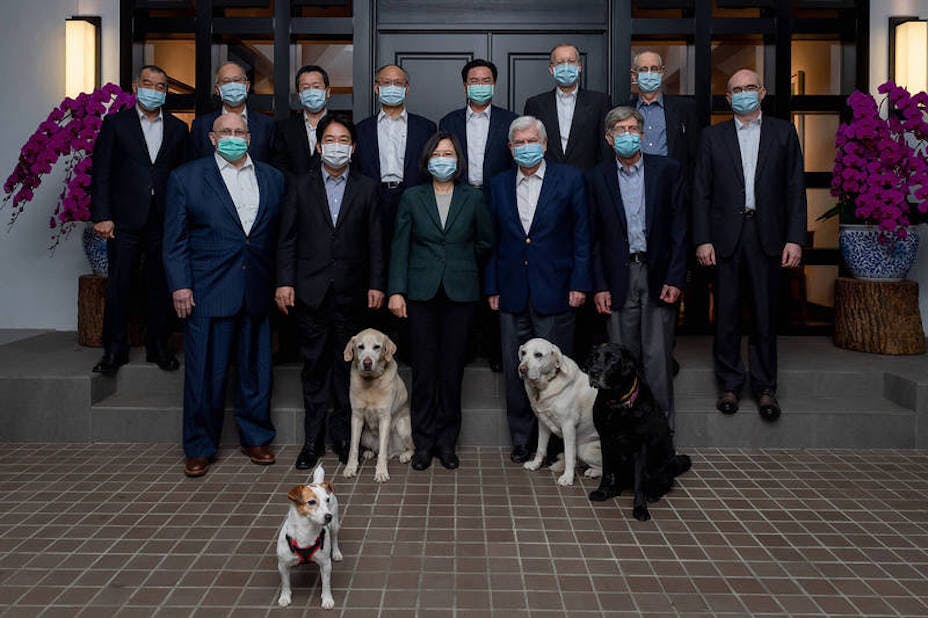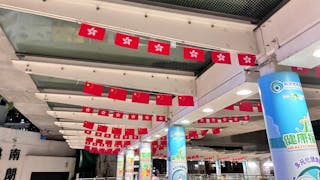從4月15日至17日美國前參議員多德(Christopher Dodd)率團訪問台灣來看,美國政府目前正在採取一項新政策,不僅要讓台灣,還要讓日本參與華府對北京的政策主張。
多德率領的代表團,成員包括前副國務卿阿米蒂奇(Richard Armitage)、斯坦伯格(James Steinberg),以及美國國務院台灣協調處處長白丹利(Dan Biers)。 他們一行在4月15日下午抵達台灣桃園機場,台灣外長吳釗燮和美國在台協會處長酈英傑( William Brent Christensen)到機場接機。
北京抗議美國代表團訪台
有報道指多德是美國總統拜登的摯友。在北京,中國外交部發言人趙立堅4月14日表示,美國應「立即停止任何形式的美台官方往來,慎重妥善處理涉台問題」。 在外交部新聞發布會上,有記者提到美國代表會見台灣的總統蔡英文,但是趙立堅說「蔡英文只是中國的一個地方領導人」,美國應該堅持「一個中國」原則,「不要向台獨勢力發出錯誤訊號,以免給中美關係和台海和平穩定造成顛覆性影響和破壞」。
4月15日晚,蔡英文在台北主持晚宴,接待美國代表團。台灣方面出席的包括副總統頼清德、國家安全會議秘書長顧立雄、國防部長邱國正,以及行政院經貿談判辦公室總談判代表鄧振中。台灣方面的陣容表明,台灣政府對影響台灣海峽和美台關係的三個主要問題,即台灣安全、防務和台美貿易感興趣。蔡英文在晚宴上表示,她期待深化台灣和美國的夥伴關係。而在與美方代表較早時的會晤中,蔡英文表示,「非常願意和理念相近國家,包括美國,共同守護印太區域的和平與穩定,並且阻止冒進以及挑釁的行為」。
4月15日,美國代表團與6名台灣立法委員晤談。美方對國民黨對於「九二共識」的態度深感興趣,出席晤談的國民黨籍立委表示,他們不會改變對「九二共識」的看法,但「九二共識」並不等於「一國兩制」。
其中一名國民黨籍立委陳以信表示,台灣的年輕人對美國所知有限,也不了解中國大陸,他們缺乏國際觀。 陳以信又說,台灣青年不怕兩岸衝突但不願當兵。 但是,民進黨籍立委羅致政隨即反駁,指台灣青年很了解外面的事務,例如蔡英文當選,他們支持蔡英文的同時,也是對中國投反對票,而香港則是重要因素。另一位立法委員、民眾黨的高虹安則表示,台灣在半導體供應鏈方面應該跟美國有更多合作。不過,據報道,與會的台灣立委都沒有向美方提及美國含瘦肉精豬肉出口台灣的問題。
4月17日,國民黨籍立委蔣萬安向台灣傳媒透露,他在與美國代表的會晤中表示,九二共識不是一國兩制,國民黨也堅決反對一國兩制,「若九二共識現在不再被多數民眾接受,國民黨內也一直在討論提出新的具體可行論述。」蔣萬安是國民黨年輕有魅力的立委之一,他的言論不僅可以看作是藍營新生代的觀點,而且可能朝着淺綠的方向傾斜。
日本捲入美方對華政策
4月17日,美國國務院東亞及太平洋事務局副助理國務卿孫曉雅(Sandra Oudkirk)在美國傳統基金會的網上座談會中表示,拜登政府批准了加強美台之間的非正式交往的新指引,新指引比2015年的舊指引有「長足進步」。她補充說,美國和台灣在許多領域進行合作,包括雙方在區域內的海事合作。她與台灣外交部政務次長田中光進行了線上討論。有報道指,美國在台協會處長酈英傑任期將於年中屆滿,孫曉雅將接任處長一職。
據了解,新指引允許美國官員在美國聯邦政府建築和在美國的台北經濟文化代表處,與台方定期舉行會議,亦允許美國官員在台灣原大使館所在的華盛頓雙橡園(Twin Oaks)出席活動,但新指引仍禁止美國官員出席如雙十節等慶祝活動,因為這可能被認為牴觸美國的對華政策。美國前國務卿蓬佩奧無視舊指引,新任國務卿布林肯則主張擴大美台聯繫。
另外,日本首相菅義偉訪美會晤拜登後,他在提及中國被指企圖改變東海及南海現狀時表示:「我無意在有關主權和包括民主、人權和法規在內的普世價值觀的議題上讓步。」並表示日本會就緬甸、新疆和香港等議題堅定發聲,並與國際社會一起努力尋求進行具體行動。
北京的反應除了重申台灣,香港和新疆屬於中國內政外。 4月15日至20日,中國軍方在南海進行了演習,時間恰好在美國代表團訪台期間。
美台接觸的新時代
以事論事,美國訪台代表團的訪談內容與背景在政治上具有挑釁性。首先,由4名成員組成的代表團中包括國務院的一名官員,這也許表明美國放寬了與台灣的更緊密接觸的新指引;其次,代表團中3名成員曾是高級官員,他們獲台方高規格接待,揭櫫了美台接觸的新時代;第三,美國代表團的目的還在於探討包括立法委員及年輕一代台灣人對兩岸關係的態度,以及他們對台海衝突前景的看法;第四,美國和日本最近發表的聯合聲明,涵蓋了台灣──這是史無前例的舉動,已經引起中國駐華盛頓大使館的強烈反應。
總括而言,美國代表團訪問台灣,揭櫫了拜登政府領導下的美台接觸的新時代。這次訪問達到表明美國在安全、防務和經濟領域重視台灣的目的。鑑於拜登政府決心在各個方面積極主動地與台灣接觸,並且日本作為美國的盟友,正愈來愈多地被捲入複雜的北京─華盛頓─台北政治事務中,因此,台灣在未來數年將無法避免成為中美之間爭執的焦點。
Analysing the Political Context and Content of US Delegation to Taiwan
Judging from the political context and context of the visit of a delegation of former US officials to Taiwan from April 15 to 17, the US government is now adopting a new policy of engaging not only Taiwan but also Japan in its assertive policy toward the People’s Republic of China (PRC).
The delegates were composed of including the former Senator Christopher Dodd, former assistant secretary of state Richard Armitage, assistant secretary of state James Steinberg and the US State Department’s Taiwan coordinator Dan Biers. They arrived at the Taiwan international airport in the afternoon of April 15, when Taiwan foreign minister Joseph Wu and Director of American Institute in Taiwan (AIT) Brent Christensen greeted them.
Christopher Dodd is reportedly a close friend of US President Joe Biden. On April 14, the PRC Foreign Ministry spokesman Zhao Lijian said that the US “should immediately stop any kind of formal interactions between the US and Taiwan,” and that the US “should manage the Taiwan affairs carefully.” During Zhao’s press conference, a reporter mentioned that the US delegates would meet Taiwan president Tsai Ing-wen, but Zhao remarked that Tsai “is only a local leader of China,” and that the US should adhere to the principle of one China “without creating any wrong signal to the forces of Taiwan independence” and “without seriously undermining Sino-US relations and the peace and stability of the Taiwan Strait.”
On the night of April 15, Taiwan’s leader Tsai Ing-wen hosted a dinner to receive the four-member delegation from the US. The Taiwan side witnessed the attendance of vice-president William Lai, National Security Council secretary Wellington Koo, defence secretary Chiu Kuo-cheng, and Executive Yuan minister John Deng Chen-chung (who deals with trade affairs). The line-up of the Taiwan side showed that the Taiwan government was interested in three major issues impinging on the Taiwan Strait and US-Taiwan relations, namely national security, national defence and trade. Tsai remarked in the dinner that she expected both Taiwan and the US would deepen their partnership. In her earlier meeting with the delegation, Tsai went so far as to assert that Taiwan would be willing to cooperate with those “ideologically close partners” in the Indo-Pacific region to “stop adventurist and provocative behaviour.”
On April 15, the US delegation met six members of the Taiwan Legislative Yuan. The US side was deeply interested in the attitude of the Kuomintang toward the 1992 consensus. KMT members replied that they would not change their view toward the 1992 consensus, but the 1992 consensus was not equivalent to the “one country, two systems.” KMT legislators who met the three delegates also said that the party would not accept the “one country, two systems” (Liberty Times, April 15, 2021). The KMT members spent considerable time to discuss with the Americans on the 1992 consensus while refraining from mentioning the party’s opposition to the import of American pork to Taiwan. The US delegates were interested in the attitude of the young Taiwanese toward the US and the prospects of any military conflicts.
One young KMT member, Charles Chen, said that the young people of Taiwan are unfamiliar with both the US and mainland China, and that they lack an international outlook. Chen added that the Taiwan youth are not afraid of cross-Strait conflicts and yet they have not shown their eagerness to join the Taiwan military. Yet, DPP member Lo Chih-cheng argued against Chen’s perspective, saying that the Taiwan youth are international in their outlook, and that they support Tsai Ing-wen while opposing the PRC. Most importantly, the Hong Kong factor is important in the minds of many Taiwan youths. Another legislator, Kao Hung-an from the People Party (PP), said that Taiwan should cooperate with the US more in the development of the semi-conductor industry and its supply chain.
On the same day, Taiwan Premier Soo Tsing-tshiong met the US delegates and expressed his view that the trade relations between Taiwan and the US could be strengthened, including the possibility of re-negotiating the Trade Investment Framework Agreement and the Bilateral Trade Agreement, for the sake of achieving mutual economic prosperity. Soo said that the delegation’s visit was historically very significant. In response to Soo’s remarks, Dodd said that their visit took place at a significant juncture, and that the delegation “represents the importance of Taiwan to the US and the American partisan support of Taiwan” (Liberty Times, April 15, 2021). Soo added that Taiwan would like to get the US support for it to join more international trade organizations, while affirming Taiwan’s commitment to coping with climate change through the efforts at reducing coal usage, controlling carbon emission and enhancing energy transition.
On April 17, KMT young leader Chiang Wan-an revealed to the Taiwan media that, on April 15, as one of the six legislators meeting the US delegation, he said the 1992 consensus was not equivalent to “one country, two systems.” Moreover, Chiang added that the KMT “resolutely opposes the ‘one country, two systems’ and that the party is now deliberating on whether a new and concrete stance would come out “if the 1992 consensus were not accepted by most of the people” (Liberty Times, April 17, 2021). As one of the charismatic young KMT leader, Chiang’s remarks could be seen as not only representing the perspective of the Young Turks within the blue camp, but also drifting toward the light green direction.
On April 17, Sandra Oudkirk, the US State Department’s Bureau of East Asian and Pacific Affairs deputy assistant secretary of state, remarked in a talk at the Heritage Foundation that the Biden administration approved the new guidelines of enhancing unofficial interactions between the US and Taiwan sides, and that these new interactions represented “a huge step forward” from the old guidelines in 2015. She added that the US and Taiwan cooperate in many areas, including maritime collaboration between the coast guard of the two sides and the Global Cooperation Training Framework. She engaged in a virtual discussion with Taiwan’s deputy foreign minister Tien Chung-kwang, noting that the new guidelines “explicitly encourages engagement with Taiwanese counterparts” and “removes overly-onerous restrictions that complicated our ability to engage with Taiwan on issues of mutual concerns.”
The new guidelines are reportedly allowing US officials to hold regular meetings with Taiwanese counterparts in US federal buildings and at Taiwan’s representative offices in America. They allow US officials to attend events at Twin Oaks, the former Taiwan’s ambassadors’ residence in the US which is now used for official functions, but the new guidelines prohibit US officials from attending events on Taiwan’s holidays, such as the double tenth national day, which could be regarded as conflicting with America’s one-China policy (Focus Taiwan, April 17, 2021). The old guidelines were removed by the former secretary of state Mike Pompeo. His successor Anthony Blinken favours the expansion of US contacts with Taiwan.
While the US delegation’s visit to Taiwan and the relaxed US guidelines on closer US-Taiwan interactions displeased and provoked the PRC, another provocative gesture was made by a declaration jointly issued by Japanese Prime Minister Yoshihide Suga and US President Joe Biden after Suga’s visit to the US on April 15. On April 16, Biden and Suga addressed a whole range of geopolitical issues in the joint statement, including “the importance of peace and stability of the Taiwan Strait” (Reuters, April 17, 2021). President Biden said in a press conference: “Today Prime Minister Suga and I affirmed our ironclad support for the US-Japanese alliance and for our shared security. We [are] committed to working together to take on the challenges from China and on issues like the East China Sea, the South China Sea, as well as North Korea, to ensure a future of a free and open Indo-Pacific.” Biden and Suga also talked about the developments in Hong Kong and Xinjiang.
In response, the PRC Embassy in Washington said that China is “resolutely opposed” to their joint statement and that Taiwan, Hong Kong and Xinjiang belong to China’s internal affairs. From April 15 to 20, the PRC military conducted exercises in the South China Sea, a move coincidentally matching the visit of the US delegation to Taiwan.
Analytically speaking, the content and context of the US delegation to Taiwan became politically provocative. First, the four-member delegation included an official from the State Department, showing perhaps the implementation of the relaxed new guidelines from the US on closer contacts with Taiwan. Second, three members of the delegation were formerly high-ranking officials and their high-level reception by the Taiwan side officially illustrated a new era of US-Taiwan contacts. Third, the US delegation also aimed at probing the responses of the Taiwan people, including legislators and their younger generation, to not only Taiwan’s relations with mainland China but also the prospects of conflicts in the Taiwan Strait. Fourth, the joint statement issued by US and Japan covered Taiwan – an unprecedented move that has already triggered a strong reaction from the Chinese Embassy in Washington.
In conclusion, the visit of the US delegation to Taiwan represented a new era of US-Taiwan contacts under the Biden administration. Its visit achieved the objective of demonstrating the importance that the US attaches to Taiwan in the security, defence and economic spheres. Given that the Biden administration is determined to assertively and actively engages with Taiwan in various aspects, and that Japan as a US ally is increasingly dragged into the complex triangular Beijing-Washington-Taipei politics, Taiwan is going to be an inevitably bone of contention between the US and China in the years to come.
原刊於澳門新聞通訊社(MNA)網站,本社獲作者授權轉載。





































